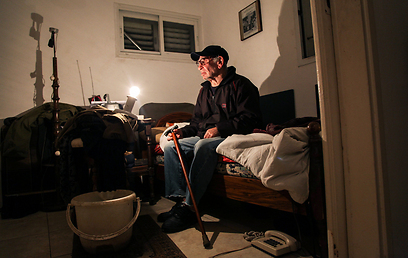
One in four of Israel's 200,000 Holocaust survivors suffers from economic distress which is expected to worsen due to the austerity measures that are said to take place in 2013, a new report reveals.
Marking the International Holocaust Remembrance Day, the Foundation for the Benefit of Holocaust Victims in Israel (FBHV) published data which revealed that 87% of survivors who asked for financial aid in 2012 – about 20,000 people – were subsisting on less than NIS 5,000 (roughly $1,350) a month.
Related stories:
- UN marks Int'l Holocaust Remembrance Day
- Indians exposed to Holocaust studies
- Rare Holocaust diary unveiled
About 58% of aid seekers survive on NIS 3,000 ($800) alone. The aid requested sometimes includes provisions for dental care or reading glasses, as the survivors' health worsens as they get older.
"I eat twice a day, that's enough. But there's not enough money for medicine or heating so every day you calculate what to save and what to spend," said Shalom Lazar, 75, who escaped the Nazis with his family as a child, and came to Israel in the '70s.

Shalom Lazar at his home (Photo: Avishag Shaar-Yeshuv)

Lazar as a young man (Reproduction: Avishag Shaar-Yeshuv)
"I'm helped by volunteers who bring food once a week, otherwise I couldn't survive," said Lazar, whose entire income totals NIS 2,800 ($750), comprised of an elderly stipend and guaranteed income from the National Security.
Apart from the dire economic straits, one of the major problems which Holocaust survivors face is loneliness.
Some 10,000 survivors are childless, half of them are widowed, and many have no contact with their families.
"It's a great desperation. The loneliness is hard when you come home and can only talk to the walls," said Lazar, who lives alone in a room and a half apartment in Jaffa.
It appears the latest bump in the State's budget for the welfare of Holocaust survivors – a NIS 50 million ($13.5 million) increase, which has put the total budget at over 2 billion – is not enough.
"The welfare services offered to Holocaust survivors haven't been updated since 2007 despite their growing needs," said Rony Kalinsky, CEO of the FBHV. "I'm afraid that in 2013, which is said to be an austere year, Holocaust survivors in Israel will continue to suffer."
According to Kalinsky, the next three years are "critical years which pose the last chance to allow a respectable existence to Holocaust survivors."
Last year had also shown a marked rise in anti-Semitic incidents worldwide, as indicated by the annual anti-Semitism report by the Cantor institute.
The report, which has been submitted to the government Sunday morning, links the violent incidents to the rise of extreme parties which demonize Israel, and also notes the increased popularity of Jew-related conspiracy theories on the social networks.
The annual International Holocaust Remembrance Day, set by the UN in 2005, is marked on January 27, the day the Auschwitz-Birkenau concentration camp was liberated by the Red Army on 1945.
- Receive Ynetnews updates
directly to your desktop















